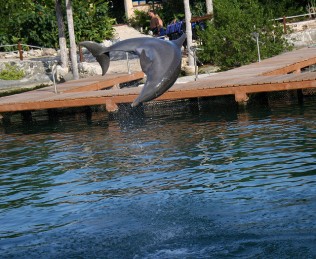
The 2014 Travel Bloggers Exchange, or TBEX, happens this week in Cancun, Mexico. TBEX is the world’s best known travel bloggers conference. Bloggers attend in order to hone their craft and network with each other, destinations, airlines, and other travel brands that may have stories to tell or sponsorships to offer.
So what’s the problem?
The controversy began when bloggers realized that the TBEX program included an optional “swim with dolphins” at Cancun’s dolphinarium. Green Global Trave wrote, “Let’s get the obvious out of the way, right from the get-go: Dolphin tours are bad for dolphins.”
Blogger Matt Kepnes was one of the first to protest the dolphin tours. As Kepnes put it, “Captive dolphin experiences are a mass market, irresponsible form of tourism and it’s shocking that a travel organization that often talks about responsible tourism would promote such an activity.” Kepnes has called for a boycott of TBEX North America and other bloggers have joined in.
Times are changing, and the public comfort with captive dolphin programs is not what it was in the “Flipper” era. The box office success of movies like The Cove and Blackfish have brought increased attention to the horrors of captive whale and dolphin facilities, like Richard Branson’s February announcement that Virgin will no longer partner with organizations that continue to take cetaceans from the ocean. Southwest Airlines even canceled a long sponsorship with Sea World this year.
As Ethical Traveler has written in the past, there is only one circumstance where swimming with the dolphins is ethical: the very rare case when free, wild dolphins curiosity drives them to approach and interact with humans. In comments about the TBEX boycott, Nancy D. Brown recalls her authentic, non-captive experience: “I loved swimming with dolphins in Hawaii’s Pacific Ocean. It was the dolphin’s decision if he/she wanted to swim with me or steer clear. Loved dipping my head underwater and hearing the pod clicking with one another!”
So, why are captive dolphin programs unethical? Neuroscientist and Senior Lecturer in the Department of Psychology and faculty affiliate of the Center for Ethics at Emory University, Dr. Lori Marino, says that peer-reviewed studies show:
- Captive dolphins exhibit clear signs of psychological trauma, stress and self-mutilation.
- Captive dolphins die prematurely.
- The largest tank in the world is something like less than one ten-thousandth of one percent of the natural range of most dolphins and whales.
Captive dolphin programs sustain the bloody, cruel dolphin hunting industry by creating a demand for dolphins. The blood in the water from thousands of killed dolphins is seen in several articles.
Dolphin facilities often claim that the captive dolphin programs help educate the public about dolphins and dolphin conservation. Does that claim hold up under scrutiny? Dr. Marino is firm here. “There’s no compelling evidence, at all, that visiting dolphin shows and seeing dolphin and whale displays is educational. I’ve done a lot of research in this area and I’ve published peer-reviewed papers that show this so-called ‘educational claim’ is not supported by any evidence.”
TBEX itself claims it would be unethical to take any stance on the captive dolphin issue. In a comment to the British newspaper The GuardianBrooke MacDonald and Morgan Catching Japanese Fishermen Slaughtering Dolphins — Content Warning: Age Restriction, TBEX said they would not be “bullied into canceling a tour by a small pressure group.”
Fortunately, other decision makers had a different response to the boycott, Cancun’s tourist board removed the free swim-with-dolphin tours from the TBEX program. It’s a small step, and an inadequate one, but it does deserve recognition.
Did the TBEX boycott make a difference? “The messages and morals of this story are unclear,” said Chris Pitt, campaigns manager for Care for the Wild International. “TBEX felt it was their right to offer the tours, and Cancun have cancelled them because of the adverse publicity. Neither of those policies scream “we’re concerned about the dolphins’. But it’s a start. What this campaign has shown is that keeping dolphins captive for people’s entertainment is no longer something that should be blindly accepted.”
Ecotourism pioneer Dr. Martha Honey will give the keynote speech at TBEX. In a press release about the TBEX boycott, she writes that dolphins “deserve to live a life free from captivity.” We trust that Dr. Honey will use her keynote as an opportunity to reach travel bloggers who chose to attend TBEX in spite of the boycott, and to speak out strongly against captive dolphin programs.
Ethical Traveler supports the “Boycott TBEX” movement. That being said, we also support bloggers who wish to gather first-hand knowledge of the sad situation of captive dolphins, as long as they share the sadness with their readers. The TBEX boycott has brought much-needed attention to the ethics of dolphinariums and similar programs.
You can take action by: just saying no to captive dolphin programs, voting with your dollars, and if you are a blogger, attending TBEX in Cancun to help inform your readers about why they should not patronize captive dolphin programs of any sort. If we travelers stop spending money at such attractions, it will be easier for governments to do the right thing. Currently, Mexico is considering a ban on keeping marine mammals in captivity for entertainment or commercial breeding purposes.
Disclosure: Marine mammal conservationist The Cove‘s Ric O’Barry is affiliated with the Earth Island Institute, as is Ethical Traveler.
Read Ethical Traveler's Reprint Policy.
